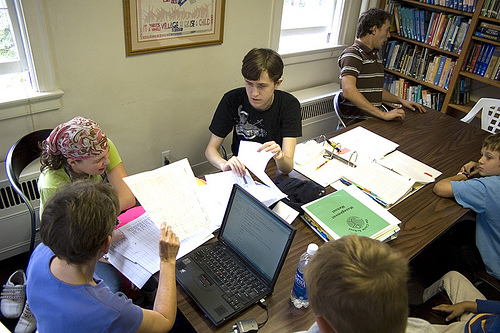Vesting students as co-owners of schools
In many public schools, learning has been paralyzed by a combination of poor teaching, peer pressures that undercut academic success, and outright disruption of classrooms. More than half of the students ent ering ninth grade drop out or otherwise fail to graduate from high school in many large North American cities.
ering ninth grade drop out or otherwise fail to graduate from high school in many large North American cities.
Healthier outcomes may emerge by engaging students as designers -- and stakeholders -- of a different kind of escape path from under-performing schools.
A new framework for success-sharing
Many states now permit formation of for-profit charter schools, as an alternative to failed or failing public schools.
Although such ventures to date have been typically structured along standard business lines, their equity structures could be broadened to vest students and their families with equity interests.
For students and parents alike, the size of the shareholding and the annual dividends might be linked to criteria such as the following:
- Measurable gains in overall skills during the previous year by the charter school’s students; and
- The success of each student’s chosen peer groups during the year in gaining skills, and/or in staying out of trouble. (Each student annually might make or renew a pact for this with four or five friends.)
Such an approach would help align the near-term, as well as long-term, interests of students and their families with learning success.
Meeting and surpassing standards: partnering options with virtual charter schools
To meet curriculum requirements, the new actual charter schools could draw upon a growing range of online resources. More than 30 "virtual charter schools" are now offering online solutions to fulfill the standards often lacking in public schools.
Online core courses offered by virtual charter schools could be enhanced, over time, by new material from students versed in new media and the course topics. A growing number of sites such as StudentsKnow.com, Learnhub.com, and Wiziq.com enable students to create -- and earn revenues from -- online learning materials.
These sites, along with similar, downloadable authoring tools, could be used by students to steadily enrich the curriculum offered by the new charter schools and their virtual partners.
As the range of (highly-rated) new learning resources grew, further audiences could also be reached by the interactive online learning system.
Prize-winning content created by students in the new charter schools could be offered online as a free learning resource for those who remain caught in poorly-performing public schools, and who desire access to higher quality learning opportunities. Microvoucher coupons could help public school students in poor neighborhoods afford after-school internet costs, if they lacked other ways to connect with the new online learning resources.
Awards for the best student-created plans
How could charter schools co-owned by students emerge?
One option would be to launch competitions to recognize and reward public students who prepare charter school market studies and business plans.
Outstanding proposals to launch new for-profit charter schools -- schools featuring results-focused systems to promote peer-learning and discourage adverse peer pressures -- could earn prizes and other rewards for their creators.
The best of the proposals could be the basis for private investors to launch new charter schools, with a pre-set equity share for the initial designers as well as for families whose students enroll in these learning ventures.
Next steps
Openworld welcomes inputs from individuals and organizations interested in exploring opportunities for student co-owned charter schools. We would like to gauge prospects for local, regional, and/or national competitions to engage students in designing pilot schools along the lines described above.
If you are interested and would like to discuss ways to help, please share your ideas in an email to: info (at) openworld.com.
